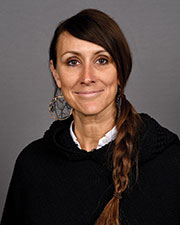
Kristin Eckel Mahan, PhD
- Associate Professor, IMM-Center for Metabolic and Degenerative Diseases
Contact
Kristin Eckel Mahan, PhD713-500-2487
Program Manager - Research
Evelyn Capadocia
713-500-2345
Biography
Dr. Eckel-Mahan received her Ph.D. from the University of Washington, Seattle, where she studied the mechanisms underlying the circadian activation of the ERK/MAPK pathway and the importance of this circadian activity for hippocampal learning and memory. Following the completion of her PhD, Kristin continued her scientific training at the University of California, Irvine, where she studied the mechanisms by which nutrients and metabolites control the circadian properties of the liver. In 2015, she joined the Institute of Molecular Medicine as an Assistant Professor in the Center for Metabolic and Degenerative Diseases.
Areas of Interest
Research Interests
Projects in the Eckel-Mahan lab center on the roles of the circadian (i.e. 24-hr.) clock in health and disease states. Circadian rhythms, which are endogenous, self-perpetuating oscillations of 24-hr. periodicity, are present in almost all cells of the body and regulate diverse cellular activity, from gene expression to synaptic plasticity. Genetic or environmental disruption of our 24-hr. clock increases our risk for several diseases, including diabetes, obesity, and cancer. The lab is trying to understand why circadian disruption produces these effects.
While the central pacemaker of the brain is entrained by light, circadian oscillations in peripheral organs are heavily influenced by other zeitgebers (“time-givers”) such as food. When clocks across the body are not in alignment, metabolic disease results. Our current experiments include those designed to reveal which zeitgebers are most important for tissue-specific clock function and the mechanisms underlying their zeitgeber properties. In addition, we are interested in how disrupted peripheral clocks communicate back to the brain to affect energy balance. A second major emphasis of the lab is to determine how circadian disruption leads to specific types of cancer, specifically, hepatocellular carcinoma.